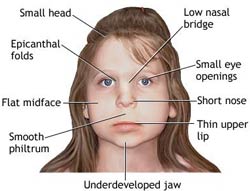Researchers tackle fetal alcohol syndrome in Russia
April 2010 | Volume 9, Issue 2
Cultural norms, such as high alcohol consumption in Russia, often act as a barrier to implementing research findings that improve health. Alcohol use poses an alarmingly high risk for pregnancies and fetal alcohol spectrum disorders (FASD) are common. Fetal alcohol syndrome, the leading cause of preventable mental retardation in the world, can also result in birth defects including abnormal facial features, growth problems, trouble remembering or learning, vision or hearing deficiencies and behavioral problems.
Dr. Tatiana Balachova, a grantee of Fogarty's
Brain Disorders in the Developing World program and clinical psychologist at the University of Oklahoma, has taken the first steps to address the problem in Russia by establishing educational programs and physician counseling sessions for women at risk for these conditions. Her goal is to design an alcohol-exposed pregnancy prevention measure for non-pregnant women of childbearing age who are sexually active and use contraceptives inconsistently. Her hope is that this intervention will ultimately be delivered routinely to large numbers of women in obstetrics clinics across Russia.

Michelle Berdy/CCP, Courtesy of Photoshare
A Fogarty grantee is studying binge drinking
among Russian women to reduce fetal
alcohol syndrome and improve infant health.
The first step was to assess the scale of the problem by conducting studies in two of Russia's largest cities, St. Petersburg and Nizhny Novgorod. "Alcohol consumption is widespread in Russia," said Balachova. "It is a social norm and a part of everyday functioning that affects the society in many ways." In a survey she and her team conducted of roughly 850 women, 57 percent of non-pregnant women reported inconsistent birth control practices, with 71 percent of the same group reporting binge drinking. Additionally, of the 11 percent of women trying to conceive, 66 percent reported binge drinking.
Though still in its early stages, Balachova's program has already made inroads. She completed an analysis of local needs and resources and identified available knowledge and existing evidence-based practices. She and her colleagues created educational materials and online training programs for medical personnel and the general public, and conducted training of physicians in prevention of the disorders.

Image courtesy of the
National Library of Medicine, NIH
Fetal alcohol syndrome, thought to be
widespread in Russia, can cause a wide
range of birth defects.
Description of diagram: face of young girl,
lines pointing to birth defects resulting from
fetal alcohol syndrome: small head,
epicanthal folds, flat midface, smooth
philtrum, underdeveloped jaw, thin upper lip,
short nose, small eye openings, low nasal
bridge
Brief physician interventions, which are short counseling sessions ideally suited for people who abuse alcohol, were also conducted with preconceptional women. The latest phase of her project includes a randomized control trial designed to test prevention measures for women at risk for alcohol-exposed pregnancies.
Most importantly, she and her team have developed specific interventions based on alcohol consumption and exposed pregnancy risk data they gathered, using what she calls an "assessment driven translational research" approach. "So far, our research has been well received and we've gotten strong support from health administrations and medical professionals," she said.
Balachova faced cultural and institutional obstacles to implementing the programs, such as lack of motivation, time constraints of physicians, inadequate training of staff and even the belief that physicians shouldn't conduct brief interventions. She also encountered misconceptions such as the notion that harm is only caused if parents are intoxicated at conception and the idea that "normal" women don't drink and are not at risk. "There is a major lack of knowledge," said Balachova. "We need to base our interventions on assessments, not assumptions."
Balachova says she has learned important lessons in capacity building and international partnerships since the program's inception. Though she did not initially recognize the importance of human subject protection, for example, she says that strengthening capacity in this area of research has become an essential component. Likewise, she acknowledges the importance of communication and flexibility when operating across cultures. "International collaboration is a process," she said. "To be successful it has to be a true collaboration: participants must speak openly, educate, discuss, and be ready to make adaptations."
More Information
To view Adobe PDF files,
download current, free accessible plug-ins from Adobe's website.